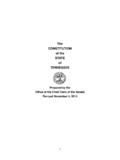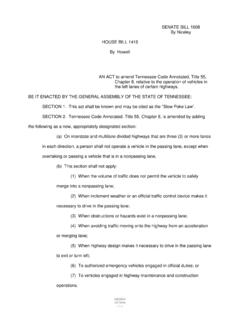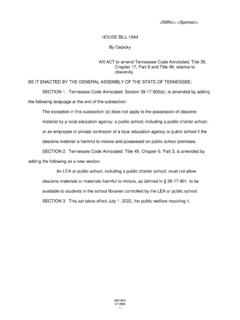Transcription of Senate Judiciary 1 Amendment No. 1 to SB0562 Signature of ...
1 Senate Judiciary 1. Amendment No. 1 to SB0562 . Bell Signature of Sponsor AMEND Senate Bill No. 562 House Bill No. 233*. by deleting all language after the caption and substituting: WHEREAS, on June 25, 2015, the United States Supreme Court published an opinion in the matter of Obergefell v. Hodges, 576 644 (2015), relative to the constitutional questions at issue under the various marriage-related laws of Ohio, Tennessee, Michigan, and Kentucky for which the petitioners sought injunctive relief; and WHEREAS, the Obergefell opinion employed a Fourteenth Amendment substantive due process and equal protection fundamental rights analysis to the constitutional issues raised in the consolidated appeal of four judgments entered by the United States Court of Appeals for the Sixth Circuit; and WHEREAS, the Obergefell opinion sets forth two holdings, the first of which addressed laws for the licensure of marriage (hereinafter "licensure statutes") in Kentucky, Michigan, and Ohio, and the second of which addressed laws denying recognition of marriage licenses issued in other states to same-sex couples, including those statutes in Tennessee that were challenged as part of the consolidated appeal in Obergefell; and WHEREAS, the first holding in the Obergefell opinion was that the state marriage licensing statutes at issue were "invalid to the extent they exclude same-sex couples from civil marriage on the same terms and conditions as opposite-sex couples", Obergefell, at 675.
2 And WHEREAS, the second holding in the Obergefell opinion regarding the non-recognition laws at issue was that "there is no lawful basis for a state to refuse to recognize a lawful same- sex marriage performed in another state on the ground of its same-sex character," Obergefell, at 681; and SA0709. 013226. -1- WHEREAS, as a result of the holdings in the Obergefell opinion, the plaintiffs in the Tennessee case, Tanco, et al v. Haslam, et al, asked the federal district court to hold Article XI, Section 18, of the Tennessee Constitution and Tennessee Code Annotated, 36-3-113 invalid under the Fourteenth Amendment to the United States Constitution and to permanently enjoin the defendants from enforcing Article XI, Section 18, of the Tennessee Constitution and Tennessee Code Annotated, 36- 3-113; and WHEREAS, the federal district court rejected the Tanco plaintiffs' proposed order, stating in the court's Memorandum and Order in Support of Final Order and Permanent Injunction that the court could not "rewrite the scope of the lawsuit" in order to address the constitutionality and enforceability of Tennessee's licensure statutes and the effect of Article XI, Section 18, of the Tennessee Constitution and Tennessee Code Annotated, 36-3-113 on the licensure statutes.
3 And WHEREAS, on August 24, 2015, the federal district court entered a Final Order and Permanent Injunction against the State of Tennessee in which the court held Article XI, Section 18, of the Tennessee Constitution and Tennessee Code Annotated, 36-3-113 to be invalid under the Fourteenth Amendment to the United States Constitution "to the extent" that they exclude same-sex couples from recognition of their civil marriage on the same terms and conditions as opposite-sex couples, when the marriage was lawfully entered into outside of Tennessee; and WHEREAS, by that same Final Order and Permanent Injunction, the federal district court permanently enjoined the defendants from enforcing Article XI, Section 18, of the Tennessee Constitution and Tennessee Code Annotated, 36-3-113 against the plaintiffs who had married in other states; and WHEREAS, Tennessee Code Annotated, 36-3-104(a) expressly limits the issuance of licenses for government-licensed marriages to male and female contracting parties; and WHEREAS, no state official or constitutional officer has been enjoined from enforcing the provisions of Tennessee Code Annotated, 36-3-104(a) or the provisions of Tennessee -2- 013226.
4 Code Annotated, 36-3-113 and Article XI, Section 18 of the Constitution to which it is subject;. and WHEREAS, the continuing enforceability of Article XI, Section 18 of the Tennessee Constitution with respect to the license statutes has created great uncertainty on behalf of a number of Christian ministers, preachers, and pastors with respect to the nature of the marital relationship they attest to having solemnized under the license statutes and marriage recordation forms issued by the executive branch and the civil and criminal liabilities they may incur as a result of non-conformity in the execution and recording of those forms; and WHEREAS, the due process provisions of the Fourteenth Amendment to the United States Constitution are proscriptive in nature, providing that no state shall make or enforce any law which shall .. deprive any person of life, liberty, or property, without due process of law; and WHEREAS, in Ex Parte Commonwealth of Virginia, 100 339 (1880), the United States Supreme Court declared the following in regard to the Fourteenth Amendment to the United States Constitution: It is not said the judicial power of the general government shall extend to enforcing the prohibitions and to protecting the rights and immunities guaranteed.
5 It is not said that branch of the government shall be authorized to declare void any action of a State in violation of the prohibitions. It is the power of Congress which has been enlarged. Congress is authorized to enforce the prohibitions by appropriate legislation. Some legislation is contemplated to make the amendments fully effective; and WHEREAS, nothing in the Fourteenth Amendment to the United States Constitution is prescriptive in nature so as to require a state to affirmatively enact any law; and WHEREAS, nothing in the Fourteenth Amendment to the United States Constitution, the Obergefell opinion, or the federal judicial power compels a state legislature to enact a law, especially a law that the people of the state have constitutionally forbidden state officials to enact; and -3- 013226. WHEREAS, no court has issued or could lawfully issue a writ of mandamus to the legislature of the State of Tennessee requiring it to enact a statutory licensure scheme by which the right to marry under Obergefell can be given efficacy or by which any particular official is required directly and by virtue of that writ alone to issue a form of license by which that right to marry can be given efficacy.
6 And WHEREAS, the General Assembly desires to fulfill the constitutional duties imposed on it in regard to marital relationships solemnized within the state under those provisions of Article XI, Section 18 of the Tennessee Constitution not enjoined by the order of any court of competent jurisdiction, to fulfill its duty to protect the common law rights retained by the people of Tennessee pursuant to the powers retained by the states under the Tenth Amendment as a separate sovereign, and to address the aforesaid uncertainties of ministers, preachers, and pastors by clarifying the operation of historic common law marriage in Tennessee; and WHEREAS, in furtherance of its stated desires, the General Assembly recognizes that in Marbury v. Madison, 5 137, 174 (1803), the United States Supreme Court said "[i]t cannot be presumed that any clause in the constitution is intended to be without effect"; and WHEREAS, the Ninth Amendment to the United States Constitution guarantees the people of Tennessee that the enumeration of certain rights in the Constitution "shall not be construed to deny or disparage others retained by the people"; and WHEREAS, a source of those other rights is the common law; and WHEREAS, the United States Supreme Court has repeatedly looked to the common law for its interpretation of rights enumerated in the Bill of Rights and for incorporating rights in the Bill of Rights into the provisions of the Fourteenth Amendment 's due process clause.
7 And WHEREAS, rights at common law are private rights and, as such, it is not only the duty of civil government not to violate them, but affirmatively to secure them; and WHEREAS, pursuant to the Tenth Amendment to the United States Constitution, the General Assembly, as representatives of the people, has the power, not abrogated by the -4- 013226. Fourteenth Amendment , to secure to the people those rights they possessed prior to ratification of the United States Constitution; and WHEREAS, the rights the people had prior to ratification of the United States Constitution were the rights of persons at common law; and WHEREAS, the United States Supreme Court stated that Sir William Blackstone's "Commentaries on the Laws of England not only provided a definitive summary of the common law but was also a primary legal authority for 18th- and 19th-century American lawyers", Washington v.
8 Glucksberg, 521 702, 712 (1997), and that Blackstone's works "constituted the preeminent authority on English law for the founding generation," District of Columbia v. Heller, 554 570, 593 (2008), quoting Alden v. Maine, 527 706, 715, (1999); and WHEREAS, according to Blackstone's Commentaries on the Law of England, at common law there were rights and duties in private economic relations reflecting the rights due to persons as members of society, and standing in various relations to each other, and among these was the marital "contract" recognizing the reciprocal rights and duties of husband and wife; and WHEREAS, the "historical institution and legal contract solemnizing the relationship of one (1) man and one (1) woman" as referenced in Article XI, Section 18 of the Tennessee Constitution existed prior to any positive enactment of any legislative body; and WHEREAS, the United States Supreme Court in Meister v.
9 Moore, 96 76, 78. (1877), addressed the recognition or existence of the common law rights and duties of marriage and stated "[t]hat informal marriage by contract per verba de praesenti .. constitutes a marriage at common law there can be no doubt, in view of the adjudications made in this country, from its earliest settlement to the present day. Marriage is everywhere regarded as a civil contract. Statutes in many of the States, it is true, regulate the mode of entering into the contract, but they do not confer the right"; and WHEREAS, the United States Supreme Court in Meister v. Moore, 96 76, 79. (1877), described the relationship between common law and state marriage statutes as follows: -5- 013226. "[a] statute may declare that no marriages shall be valid unless they are solemnized in a prescribed manner; but such an enactment is a very different thing from a law requiring all marriages to be entered into in the presence of a magistrate or a clergyman, or that it be preceded by a license, or publication of banns, or be attested by witnesses.
10 Such formal provisions may be construed as merely directory, instead of being treated as destructive of a common-law right to form the marriage relation by words of present assent"; and WHEREAS, the Meister decision recognized and emphasized an antecedent source of obligations upon officials, which legislators and judges declare but do not generate, that has deep roots in the common law; and WHEREAS, consistent with Meister, common law recognizes that there are laws or rules of action founded in those relations of justice that exist in the nature of things and are antecedent to any enactment of positive law; and WHEREAS, by Article XI, Section 18 of the Tennessee Constitution, the common law understanding of marriage in Tennessee was affirmed as the basis of the marital relationship in Tennessee; and WHEREAS, in Erie Railroad Co. v. Tompkins, 304 64, 77 (1938), the Supreme Court said, "Congress has no power to declare substantive rules of common law applicable in a State whether they be local in their nature or 'general,' be they commercial law or a part of the law of torts.










